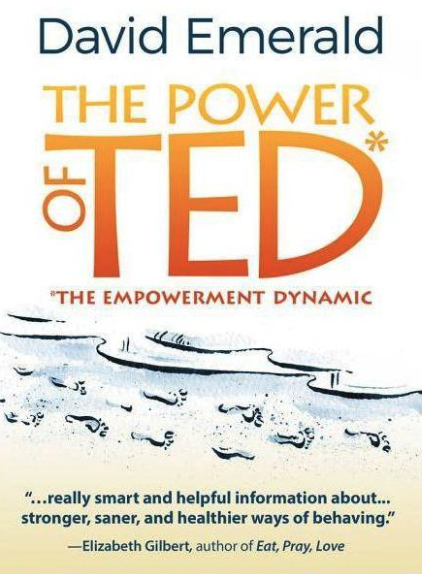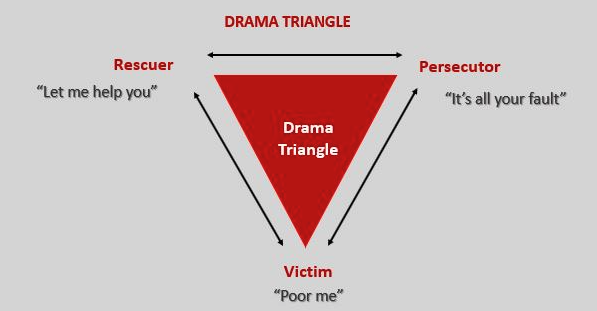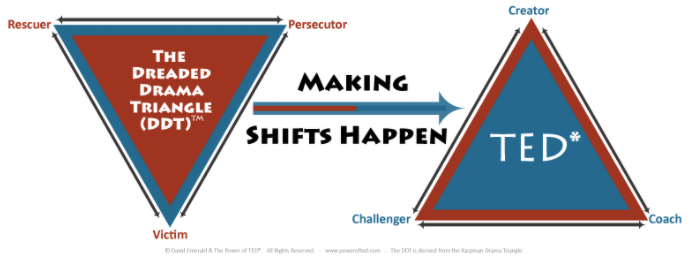“Writers write what they most need to learn.”
-David Emerald “The Power of Ted”
As the holiday season approaches many of you may find yourself engaging in similar patterns of feeling overwhelmed and engulfed by family situational dramas. This can feel stressful, disempowering, and vulnerable. You may find yourself becoming more tense and lashing out at your partner or kids. Everyday things that come up in your life are just too overwhelming to face.

If this feels like you at all you are not alone and this book may help give you the tools and new perspective to change these old ways from taking over your life. I similarly found myself in the past few days feeling stuck, sad, and frustrated by old negative patterns. After Covid, and the heated political climate, they just now tend to show up in my life during the holiday seasons.
We play all parts in life. I have continuously found myself in the role of “victim” and wanting things to change, but not knowing how to re-write this cycle. I was sort of just floating, freezing, and expecting to just “get through it”. And when it – the holiday season (it sounds like a Stephen King book) -was over, I could then refocus for about 300 days or so.
Wasn’t there a Santa Claus movie about this? Anyway.
This however, is not an empowering way to exist or move forward. Through my search for new ways of being I was recommended this book, “The Power of TED” by David Emerald.

In it, he teaches about the Dreaded Drama Triangle philosophy through a simple fable.
We learn that in order to make the big shift toward living as an empowered Creator of our lives we must first look at the maladaptive ways we often function. This negative loop is referred to by Emerald as the DDT or “Dreaded Drama Triangle.” Yikes! No one like drama, right?! Then why do we continue to engage in the cycle? Sometimes our old patterns are so ingrained we have to change ourselves in order to break out of the cycle.
What is the Dreaded Drama Triangle?

The DDT is a cycle of three roles which feed off each other. These are Victim, Rescuer, and Persecutor. In order to complete the triangle all three must be present.
It is not always “people” or “persons” which complete a triangle.
One example Emerald shares is he was walking down a path and tripped and fell. Who is to blame for tripping and falling? There is no one! So in this situation it is the loose rocks, or the sand which is to blame.
By falling he became the Victim who says “poor me”. The person who helped him get up was the Rescuer.
The Persecutor can also be a “situation” such as cancer, infertility, a heart attack, or a boss getting angry at their employee. These are all difficult situations and things which cause stress, frustration, and anxiety. These situations and causes put us in the role of victims. And as such, we try to find a Rescuer to feel better.
Notice, the Victim is at the center of this pyramid.
The Persecutor
The definition of Persecutor means that this is a person who harasses or persistently annoys.
This is a delicate dance that the Persecutor and the Victim play. It all depends on your subjective experience.
Often the Persecutor used to be a Victim. And so they say to themselves, “I will never be a victim again.”
Persecutors take on a tyrannical role. This doesn’t mean they are overtly harassing. They can still be subtle.
Often the Persecutors feel that they are the Victims, again. And so you can have two Victims who both feel that the other one is the Persecutor.
The Rescuer
This is the person who comes to “save the day”. But they aren’t really. They are doing this for their own ego.
“That sounds more like a persecutor,” you might think. It is!
The Rescuer wants to keep the Victim a Victim. In order for their “part” to work – they need a victim. Meaning, they want to be needed by the victim – because if they aren’t then they wouldn’t be needed anymore. They don’t want to be abandoned.
Sometimes a rescuer is not even a Person. A Rescuer can be drugs, food, sex, and all the other things we do to try and escape reality.
The Rescuer doesn’t want to empower the Victim. They want the Victim to stay in the role of “Poor me”. By labeling the Victim as such, then they are needed.
How do you break the cycle?
Rather than participating in life as a victim, find a way to be a Creator.
This shift is so important because rather than reacting to situations, people, or circumstances the person chooses to focus on creating the outcome they want for their life.
The Empowerment Dynamic “TED”
The author explains that the way to break out of the DDT is using TED or “the empowerment dynamic”. This changes the victim to creator, the persecutor to challenger, and the rescuer to coach.

This more empowering model helps a person to change their focus away from reacting and instead focusing on what they want in life – to how you can learn from situations.
Back to the example of when Emerald tripped and fell. Rather than feeling like a victim the next time he came across the same spot where he previously tripped he learned from it and walked a different way. This gave him the empowerment to be a creator of his life.
How do you get started
The hardest part of change is getting started. The first thing to try is to take a pause in each situation before instantly reacting in your “old way.”
Think to yourself, “what is the outcome I want for my life.” If you are struggling at work with an employer try to change your focus away from thinking of them as a persecutor and rather treat them as a Challenger. Maybe they are teaching you how to “not” treat others. Or perhaps they are providing leverage to help you make the choice to work somewhere else.
In any situation, work to be the Creator of your life and not the victim.
Help Friends and Family
One way to get out of the continuous DDT with friends is to focus on your reactions when friends or family try to be treated as victims. It is easy for a friend to be upset over a breakup and you instantly go into blaming mode and both treat the previous partner as a persecutor and your friend as the victim and you as the rescuer.
You can instead listen and empower your friend as a Coach. Never offering advice, per se, but instead hearing their story and supporting them as a person who is able to overcome any difficult situation.
Making this change is not easy. You don’t have to do it alone. For many people a positive coach in the empowerment triangle is their counselor.
Sometimes we can’t see the old pattern that is in front of us because we have been carving out the pathway for a long time. All it takes is one step at a time and you will start to see the shift and create the life you always wanted.
Make sure to get David Emerald’s life-changing book “The Power of Ted”.
If you have any other suggestions for a book review, please email: hello@sunflowercounseling.com
